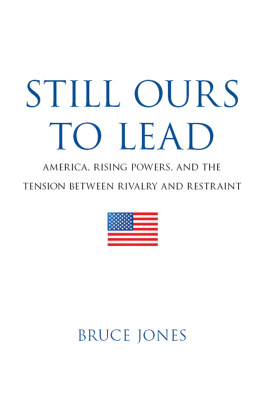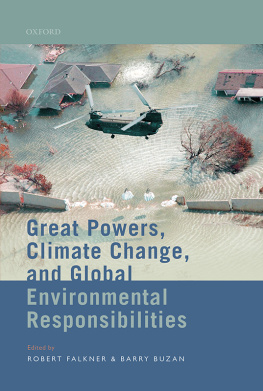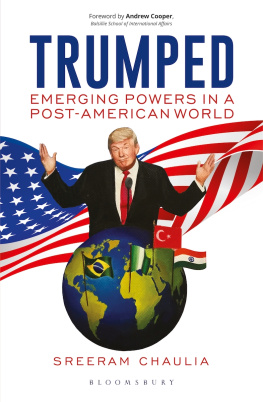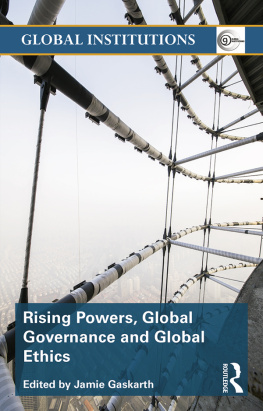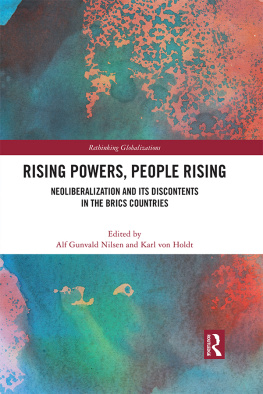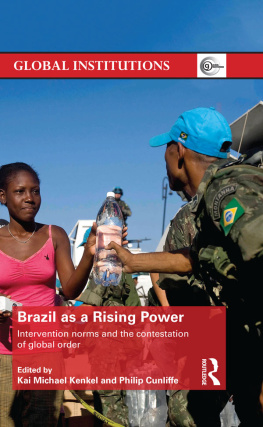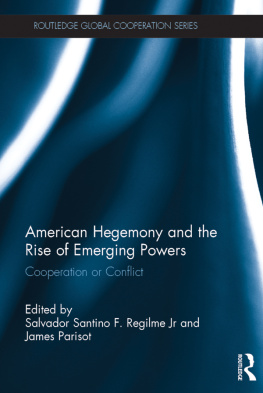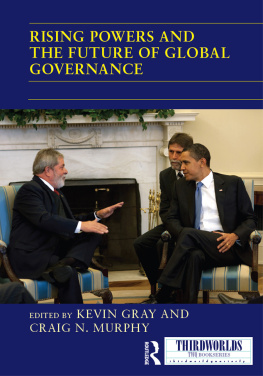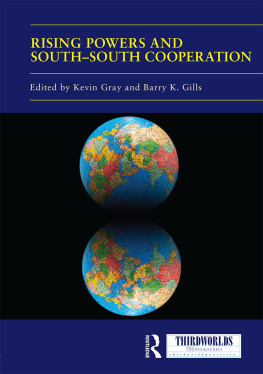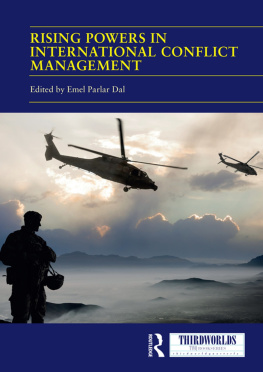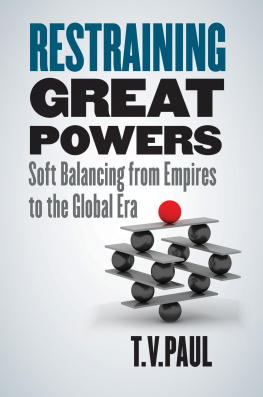Is the United States still a superpower? How are the rising powers establishing themselves in international politics and security? What is the future of global stability?
For over a decade, Bruce Jones has had a front-row seat as the emerging powersprincipally China, India, and Brazil, but also Turkey, Indonesia, Korea, and othersthrust themselves onto the global stage. From Delhi to Doha to Beijing to Brasilia, he's met with the politicians, diplomats, business leaders, and scholars of those powers as they craft their strategies for rising influenceand with senior American officials as they forge their response.
In Still Ours to Lead, Jones tells a nuanced story of American leadership. He artfully examines the tension between the impulse to rival the United States and the incentives for restraint and cooperation among the rising powers. That balance of rivalry and restraint provides the United States with a continued ability to solve problems and to manage crises at roughly the same rate as when American dominance was unquestioned. Maintaining the balance is central to the question of whether we will live in a stable or unstable system in the period to come. But it just so happens that this challenge plays to America's unique strengthits unparalleled ability to pull together broad and disparate coalitions for action. To succeed, America must adapt its leadership to new realities.
ABOUT BROOKINGS
The Brookings Institution is a private nonprofit organization devoted to research, education, and publication on important issues of domestic and foreign policy. Its principal purpose is to bring the highest quality independent research and analysis to bear on current and emerging policy problems. Interpretations or conclusions in Brookings publications should be understood to be solely those of the authors.
Copyright 2014
THE BROOKINGS INSTITUTION
1775 Massachusetts Avenue, N.W., Washington, D.C. 20036
www.brookings.edu
All rights reserved. No part of this publication may be reproduced or transmitted in any form or by any means without permission in writing from the Brookings Institution Press.
Library of Congress Cataloging-in-Publication data
Jones, Bruce D.
Still ours to lead : America, rising powers, and the tension between rivalry and restraint / Bruce Jones.
pages cm.
Includes bibliographical references and index.
ISBN 978-0-8157-2512-1 (hardcover : alk. paper)
ISBN 978-0-8157-2597-8 (pbk : alk. paper)
1. United StatesForeign relations21st century. 2. World politics21st century. 3. GlobalizationPolitical aspects. I. Title.
JZ1480.J66 2014
Printed on acid-free paper
Typeset in Sabon
Composition by Cynthia Stock
Silver Spring, Maryland
Printed by R. R. Donnelley
Harrisonburg, Virginia
O n the face of things, it has been a rough few years for the United States. America is only slowly winding down the second of two draining wars. Trying to avoid a third war, this time in Syria, has put the U.S. at odds with many of its allies in Europe and the Middle East, while Russian and Chinese intransigence has frustrated efforts to find a UN solution to that appalling civil war. And all of this after the global financial crisis put a deep dent in America's treasury and reputation.
These events inform a narrative of the erosion of American leadership and a crisis in the international order. The underlying premise of that narrative is that a combination of declining American power and the rise of the rest (of the new economic powerhouses of China, India, and Brazil, in particular) is constraining America's leadership of the international system.
Two corollary reactions to this narrative have emerged. Either America should ramp up its military and economic efforts to counter the rise of the new powers, China in particular.
This book offers a very different narrative. It argues that while other powers have gained influence, the United States, buttressed by allies, is still the most influential actor on the world stageand will be for some time to come. It also argues that the emerging powers are both a more diverse and a less threatening phenomenon than pictured, not least because they are sharply divided among themselves. And it argues that there are far more shared or overlapping interests between the established and the emerging powers than the narrative of disorder suggests.
I have spent much of the past decade watching the rising powersprincipally China, India, and Brazil, but also Turkey, Indonesia, Mexico, and othersengage the international system and struggle to alternately change it or adapt to it. Their first foray was at the United Nations, where, in the wake of the launch of the Iraq war, the emerging powers began to stake out a more determined claim for a greater share of influence in the international systeman effort I observed and tried to help shape as an adviser to Kofi Annan's effort to retool the UN to deal with modern security challenges. The emerging powers play for influence in New York was paralleled by their ambitious initiative in Geneva, at the World Trade Organization, to rebalance the rules of free trade to accommodate their growing market power. I have tracked their campaign closely since, both in international bodies and in their capitals.
The renegotiation of power relations between the established and the emerging powers at the UN and the WTO was just prologue. As the emerging powers struggle to assert themselves and the United States struggles to recalibrate its leadership to new realities, bilateral and strategic relations are being renegotiated more broadly. This transition began to absorb U.S. policymakers when the global financial crisis thrust the emerging powers from the sidelines into the spotlight.
Tracking the efforts and strategies of the emerging powers over the past decade, and looking at the underlying dynamics, leads me to three conclusions.
One, America is an enduring, not a declining, power. Now and likely for some decades to come it is and will be the most influential actor on the world stage, buttressed by strong allies. The rhetoric of U.S. decline runs well ahead of the reality. There are newly important actors on the world stage to be sure, but some of them are U.S. allies, many of them are friendly to the United States, and even those whose drive is for autonomous power share core interests with the United Statesand this includes China. Moreover, the rising powers are divided among themselves and often share as many interests with the Western powers as they do with each other. In short, the challenge these actors pose is less than has been asserted.
All the attention given to the economic rise of China has lessened the attention given to the important phenomenon of the economic rise of India and Brazil. Further, it has obscured the fact that other economies are rising too, among them Korea, Turkey, Indonesia, and Germany. And while some of America's long-standing allies (Japan, the United Kingdom, France) are experiencing a slump, so too is America's long-standing rival, Russia. The large majority of the most powerful economies remain U.S. allies. Thus the rise of the rest is a complex phenomenon and, correctly managed, offers U.S. leadership as many opportunities as challenges.

